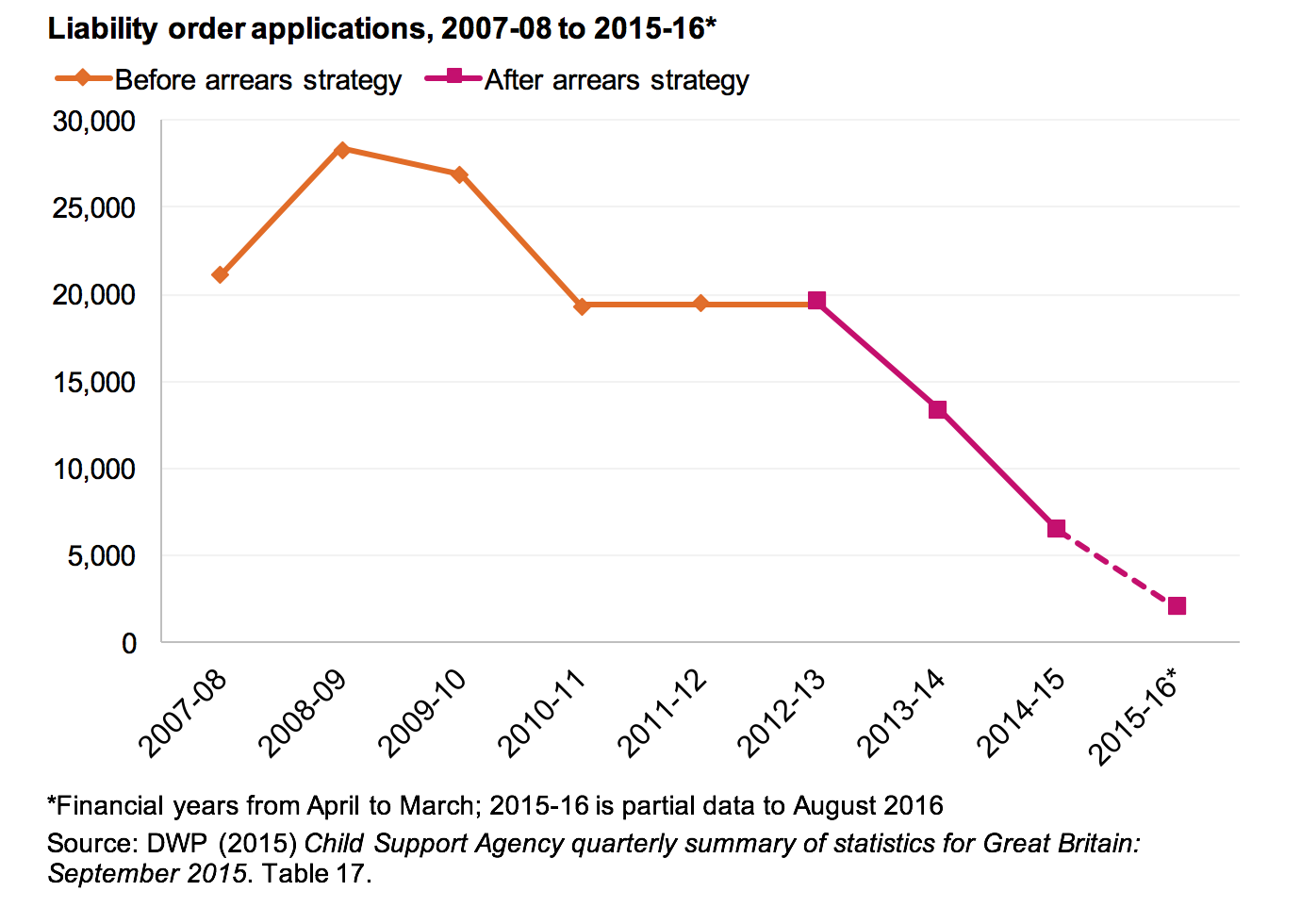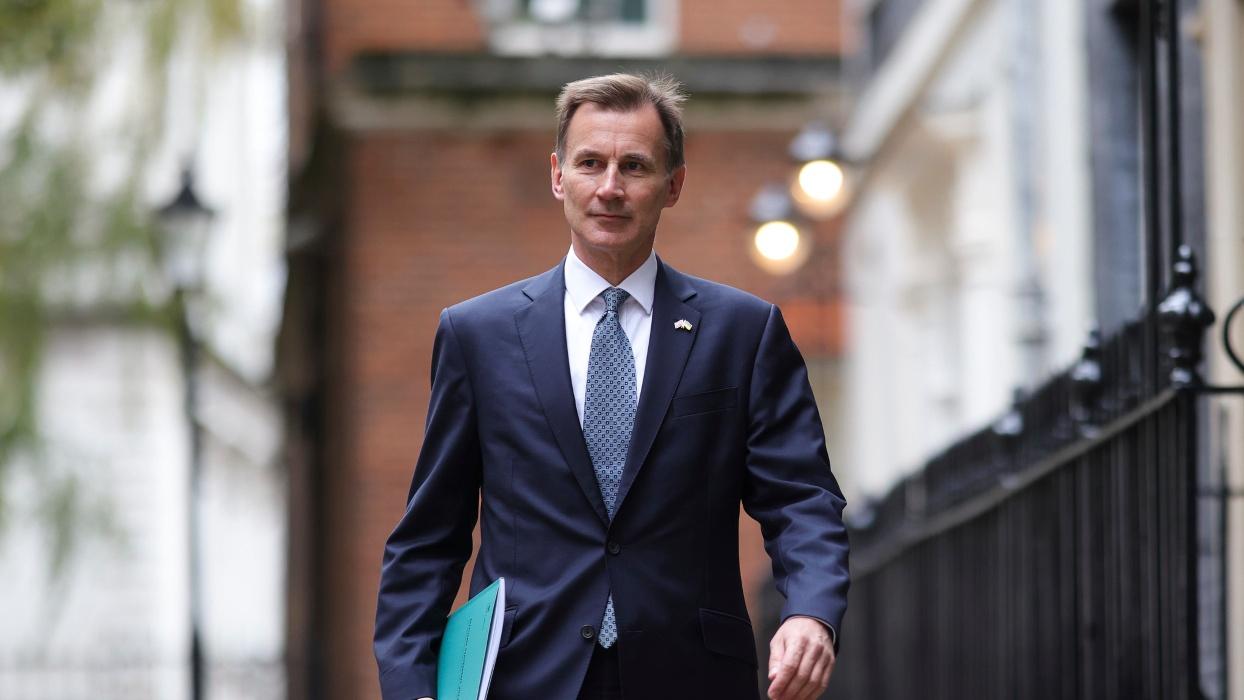 New figures released by the government show that £43.5 million is currently owed in child maintenance arrears within the new statutory maintenance system which began full operations two years ago. Janet Allbeson explains that with no key performance indicator for the collection of arrears, and with enforcement action falling, it is hard to be optimistic that the government will be effective in tackling non-payment. In the meantime, bills can’t be paid and children go without.
New figures released by the government show that £43.5 million is currently owed in child maintenance arrears within the new statutory maintenance system which began full operations two years ago. Janet Allbeson explains that with no key performance indicator for the collection of arrears, and with enforcement action falling, it is hard to be optimistic that the government will be effective in tackling non-payment. In the meantime, bills can’t be paid and children go without.
In November 2014, the then Minister for Child Maintenance declared:
For too long, a minority of absent parents have got away with failing to pay maintenance, leaving families without that financial support. This government is determined to take action to tackle this kind of irresponsible behaviour and support families.
In a press statement, he announced that, from March 2015, the Child Maintenance Service and the Child Support Agency (collectively called the Child Maintenance Group) would begin sharing information about child maintenance debtors with credit reference agencies. This would mean that child maintenance debts would have the same effect on a person’s credit score as other debts.
At the time, Gingerbread – whilst welcoming implementation of this new measure – expressed some scepticism as to whether it heralded a new approach by government to get tough with those who failed to pay their child maintenance liabilities. We pointed out that:
- It had taken seven years to implement a measure which had been on the statute books since 2008 – hardly a sign of urgency.
- Sharing information with credit reference agencies depended on a ‘liability order’ from a court – yet the number of applications for these orders had dropped substantially in recent years.
- And the Minister was openly expressing the hope that the power would be used very little – because the threat would be enough to make those who had previously failed to pay “to do the right thing”.
Gingerbread warned that, unless the government is prepared to follow words with action, non-resident parents determined to avoid paying for their children were unlikely to take much notice.
So what has happened since March 2015? On 25 November 2015, MP Karen Buck asked a parliamentary question: In how many cases had relevant information on child maintenance debts been supplied to credit reference agencies in the previous eight months? Cut through the flannel, and the answer was none at all. The flannel? Minister Priti Patel said that information had been shared with credit reference agencies – but this was “solely for sampling purposes as part of a pilot.” She failed to mention that this pilot had taken place eight years earlier – in 2007.
The Minister went on to say that “from the 30th November 2015” (in other words five days after the question had been asked) the Child Maintenance Group would start to issue written warning notices on all child maintenance debt cases with a liability order. And, if payment was not received, “the intention is to commence supplying this information to credit reference agencies in early 2016”.
Good news at last? Is the Child Maintenance Group finally getting serious about child maintenance debt collection? It is hard to be optimistic. The chart below shows the continuing fall in liability orders applied for by the Group – orders needed before a case is referred to a credit reference agency. The biggest fall follows the Department for Work and Pensions’ 2012-2017 strategy for child maintenance arrears collection and compliance, since when enforcement activity has been expressly cut back to focus on current payments.
 Yet – with the latest statistics showing that half (49 per cent) of all 133,700 paying parents in the new Child Maintenance Service having child maintenance arrears totalling £43.5 million, there is little sign that current liabilities are now being fully met.
Yet – with the latest statistics showing that half (49 per cent) of all 133,700 paying parents in the new Child Maintenance Service having child maintenance arrears totalling £43.5 million, there is little sign that current liabilities are now being fully met.
At present, the Child Maintenance Group has no key performance indicator for the effective collection of maintenance arrears for children. This is badly needed. The flaw in the Department for Work and Pensions’ current strategy of deprioritising arrears collection is that unpaid child maintenance is not just past history. It means bills can’t be paid, savings are run down, and children go without. And for single parents owed maintenance, it also means the continuous stress of trying to press a sluggish and reluctant Child Support Agency or Child Maintenance Service to take action against those parents determined to avoid their responsibilities. This is unacceptable and has to be addressed by the government.
 Janet Allbeson is Senior Policy Adviser at Gingerbread. Formerly she was Committee Specialist to the Work and Pensions Select Committee and a lawyer specialising in social welfare law.
Janet Allbeson is Senior Policy Adviser at Gingerbread. Formerly she was Committee Specialist to the Work and Pensions Select Committee and a lawyer specialising in social welfare law.








I can tell you, you don’t want a society that’s tough on Dads who don’t pay child support, because most of those dads can’t afford child support. I live in the United States and we do it. All it does is force many many fathers out of their children’s lives and into a cycle of incarceration. Trust me, you are better in Europe.
The system needs to be fairer. A non resident parent that has always supported their child goes on to have another child and because that child lives with the paying parent that child then gets penalised as pennies gets deducted if the non residents partner receives child benefit for (even though a parent with care is also in receipt of child benefit, child tax credits and benefits for themselves – the government say this is what should be lived on) child maintenance should be split fairly between all children involved – if a non resident parent has a second family no one takes into consideration that the working non resident parent – hmrc don’t say we will take into account you support another child, they base it on who lives in the home whilst the parent with care gets tax free maintenance money. The second family children are to live in poverty but if the second family split, the case gets split fairly between all children involved. No wonder why some are not paying – not because they don’t want to but because they are left with nothing after working hard. The Child Maintenance Services also only take the parent with cares word for things such as over night stays so they can claim more money. Variations for extra expenses a paying parent pays £100 a month for travel for contact and around £10 is deducted per month. So 90 a month plus child maintenance on top is a lot of money – especially if the paying parent is on a low wage. I personally think if a parent with care claims benefits should not be able to open a case as they already claim enough through the tax payer. Make it fairer and payment arrears wouldn’t be so high.